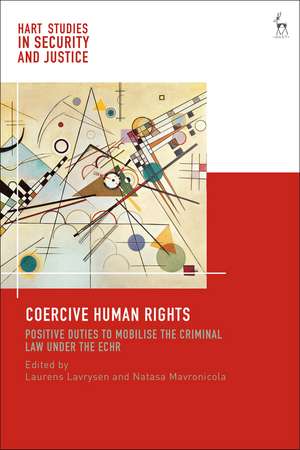Coercive Human Rights: Positive Duties to Mobilise the Criminal Law under the ECHR: Hart Studies in Security and Justice
Editat de Laurens Lavrysen, Dr Natasa Mavronicolaen Limba Engleză Paperback – 27 iul 2022
| Toate formatele și edițiile | Preț | Express |
|---|---|---|
| Paperback (1) | 252.76 lei 6-8 săpt. | |
| Bloomsbury Publishing – 27 iul 2022 | 252.76 lei 6-8 săpt. | |
| Hardback (1) | 541.85 lei 6-8 săpt. | |
| Bloomsbury Publishing – 11 noi 2020 | 541.85 lei 6-8 săpt. |
Preț: 252.76 lei
Preț vechi: 323.66 lei
-22% Nou
Puncte Express: 379
Preț estimativ în valută:
48.37€ • 49.97$ • 40.26£
48.37€ • 49.97$ • 40.26£
Carte tipărită la comandă
Livrare economică 26 martie-09 aprilie
Preluare comenzi: 021 569.72.76
Specificații
ISBN-13: 9781509945399
ISBN-10: 1509945393
Pagini: 312
Dimensiuni: 156 x 234 mm
Greutate: 0.45 kg
Editura: Bloomsbury Publishing
Colecția Hart Publishing
Seria Hart Studies in Security and Justice
Locul publicării:London, United Kingdom
ISBN-10: 1509945393
Pagini: 312
Dimensiuni: 156 x 234 mm
Greutate: 0.45 kg
Editura: Bloomsbury Publishing
Colecția Hart Publishing
Seria Hart Studies in Security and Justice
Locul publicării:London, United Kingdom
Caracteristici
Provides seamless coverage of key issues, from theoretical starting points and wider context, such as criminal law theory and the anti-impunity agenda; to specific angles, such as transitional justice; and specific rights, such as the right not to be subjected to torture and the right not to be subjected to slavery, servitude or forced labour
Notă biografică
Laurens Lavrysen is a Postdoctoral Researcher (funded by the FWO - Research Foundation Flanders), connected to the Human Rights Centre of Ghent University.Natasa Mavronicola is Reader in Law at Birmingham Law School, University of Birmingham.
Cuprins
1. Coercive Human Rights: Introducing the Sharp Edge of the European Convention on Human Rights Natasa Mavronicola and Laurens Lavrysen PART IKEY THREADS IN ECtHR DOCTRINE2. Positive Obligations and the Criminal Law: A Bird's-Eye View on the Case Law of the European Court of Human Rights Laurens Lavrysen3. Positive Obligations and Coercion: Deterrence as a Key Factor in the European Court of Human Rights' Case Law Paul Lemmens and Marie Courtoy PART IIPERSPECTIVES ON VICTIMS' PROTECTION AND REDRESS4. Retribution through Reparations? Evaluating the European Court of Human Rights' Jurisprudence on Gross Human Rights Violations from a Victim's Perspective Alina Balta5. Shaping Coercive Obligations through Vulnerability: The Example of the ECtHR Corina Heri6. Criminal Law Responses to Hate Speech: Towards a Systematic Approach in Strasbourg? Stephanos Stavros PART IIICRITICAL REFLECTIONS: THEORY, IMPACT, LIMITATIONS7. Positive Obligations in View of the Principle of Criminal Law as a Last Resort Nina Persak8. Sowing a 'Culture of Conviction': What Shall Domestic Criminal Justice Systems Reap from Coercive Human Rights? Mattia Pinto9. Coercive Overreach, Dilution and Diversion: Potential Dangers of Aligning Human Rights Protection with Criminal Law (Enforcement) Natasa Mavronicola10. Separating Protection from the Exigencies of the Criminal Law: Achievements and Challenges under Article 4 ECHR Vladislava Stoyanova11. The Limitations of a Criminal Law Approach in a Transitional Justice Context Brice Dickson PART IVUNCHARTED WATERS FOR THE ECtHR'S COERCIVE DUTIES DOCTRINE12. Preventive Obligations, Risk and Coercive Overreach Liora Lazarus13. Coercive Human Rights and Unlawfully Obtained Evidence in Domestic Criminal Proceedings Kelly M PitcherPostscript: Coercive Human Rights in Times of Coronavirus Natasa Mavronicola and Laurens Lavrysen
Recenzii
This volume is an excellent example of a critical examination of the jurisprudence of the ECHR. It not only provides clarity about their guidelines, justification and implications in an area that is gaining in importance, but also provides impetus for further development as well as references to possible limits and risks of the concept of criminal law protection obligations.
This volume demonstrates, in a holistic way, how coercive human rights duties have inevitably generated tensions with some of the more 'orthodox' concerns of human rights law . It also offers a solid basis from which to reappraise concrete developments related to the criminal law (enforcement) tools that are capable of affording effective redress for human rights violations and determine individual criminal liability.
This volume demonstrates, in a holistic way, how coercive human rights duties have inevitably generated tensions with some of the more 'orthodox' concerns of human rights law . It also offers a solid basis from which to reappraise concrete developments related to the criminal law (enforcement) tools that are capable of affording effective redress for human rights violations and determine individual criminal liability.








